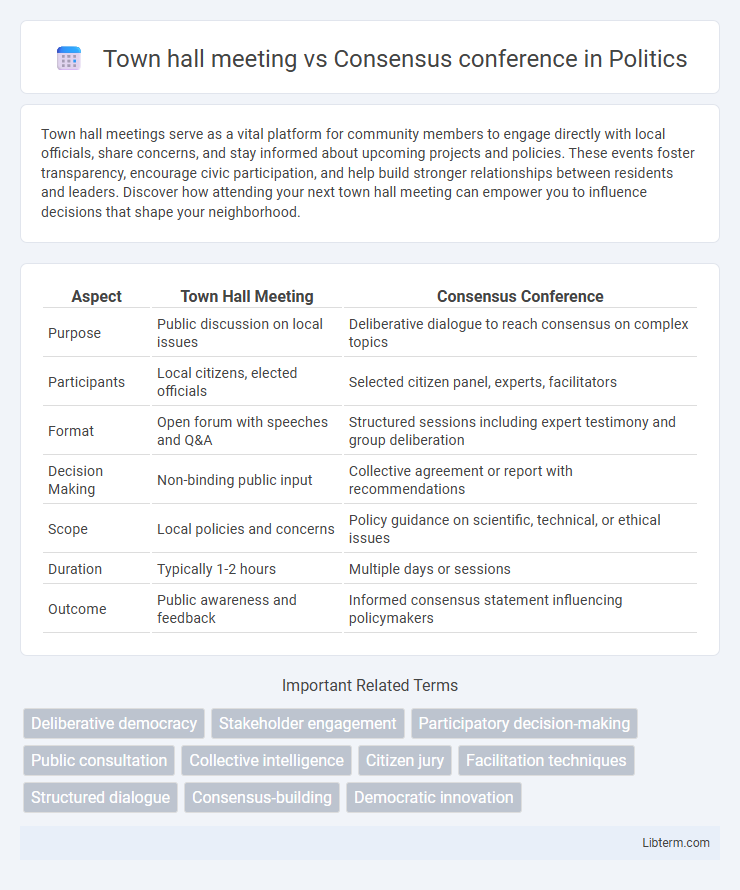Town hall meetings serve as a vital platform for community members to engage directly with local officials, share concerns, and stay informed about upcoming projects and policies. These events foster transparency, encourage civic participation, and help build stronger relationships between residents and leaders. Discover how attending your next town hall meeting can empower you to influence decisions that shape your neighborhood.
Table of Comparison
| Aspect | Town Hall Meeting | Consensus Conference |
|---|---|---|
| Purpose | Public discussion on local issues | Deliberative dialogue to reach consensus on complex topics |
| Participants | Local citizens, elected officials | Selected citizen panel, experts, facilitators |
| Format | Open forum with speeches and Q&A | Structured sessions including expert testimony and group deliberation |
| Decision Making | Non-binding public input | Collective agreement or report with recommendations |
| Scope | Local policies and concerns | Policy guidance on scientific, technical, or ethical issues |
| Duration | Typically 1-2 hours | Multiple days or sessions |
| Outcome | Public awareness and feedback | Informed consensus statement influencing policymakers |
Introduction to Town Hall Meetings and Consensus Conferences
Town hall meetings serve as public forums where community members engage directly with leaders to discuss policies, voice concerns, and share feedback, fostering transparent communication and civic participation. Consensus conferences gather a panel of informed citizens who deliberate over complex issues, aiming to reach a collective agreement that reflects diverse perspectives and informed judgment. Both formats facilitate democratic dialogue but differ in structure, participant selection, and decision-making processes, with town hall meetings emphasizing openness and consensus conferences prioritizing informed consensus-building.
Defining Town Hall Meetings
Town hall meetings are structured public forums that enable direct communication between officials and community members, fostering transparency and immediate feedback. These gatherings typically involve open discussions, Q&A sessions, and information sharing to address community concerns and policy developments. Unlike consensus conferences, town hall meetings emphasize inclusive participation and real-time interaction rather than formal decision-making or expert deliberation.
Understanding Consensus Conferences
Consensus conferences gather diverse stakeholders to deliberate complex issues, ensuring informed, collective decision-making through structured dialogue and expert input. Town hall meetings primarily facilitate open public discussions, allowing community members to voice opinions but often lacking the formal consensus-building framework. Understanding Consensus Conferences involves recognizing their emphasis on informed consensus, expert facilitation, and systematic evaluation, which distinguishes them from more general public forums like town hall meetings.
Key Differences Between Town Hall Meetings and Consensus Conferences
Town hall meetings emphasize open public discussions where community members express concerns and ask questions directly to officials, focusing on transparency and responsiveness. Consensus conferences involve a selected group of participants engaging in structured deliberations to reach collective decisions on complex policy issues. The key differences lie in participation format--open vs. selected attendees--and outcome goals--broad public input versus expert-informed consensus.
Goals and Objectives of Each Approach
Town hall meetings aim to engage a broad community audience to share information, gather diverse feedback, and foster open dialogue on specific issues. Consensus conferences focus on bringing together expert participants and stakeholders to deliberate deeply and reach a mutual agreement or collective recommendation on complex or controversial topics. The primary objective of town hall meetings is inclusivity and transparency, while consensus conferences prioritize informed decision-making and collaborative problem-solving.
Participant Roles and Involvement
Town hall meetings typically feature a diverse group of community members who actively voice opinions and vote on issues, emphasizing broad participation and democratic engagement. Consensus conferences involve selected lay participants collaborating with experts to deliberate and reach informed agreement, focusing on mutual understanding and knowledge exchange. The contrasting roles highlight town hall meetings as platforms for public input, while consensus conferences prioritize structured dialogue and informed consensus-building.
Decision-Making Processes Compared
Town hall meetings engage diverse participants in an open forum to express opinions and gather community feedback for decision-making, emphasizing inclusivity and direct dialogue. Consensus conferences involve a structured process where expert panels and stakeholders collaboratively analyze information to reach a collective agreement, prioritizing informed consensus. Both formats enhance participatory decision-making but differ in formality and the balance between public input and expert deliberation.
Advantages of Town Hall Meetings
Town hall meetings offer direct interaction between citizens and officials, fostering transparency and immediate feedback on local issues. These meetings encourage community engagement by allowing diverse voices to be heard in real-time, enhancing democratic participation. The less formal setting of town hall meetings typically leads to quicker decision-making compared to the more structured and time-consuming consensus conferences.
Benefits of Consensus Conferences
Consensus conferences facilitate in-depth public engagement by bringing together diverse stakeholders to deliberate complex issues and co-create informed recommendations. This format enhances transparency, mutual understanding, and democratic legitimacy by integrating expert knowledge with lay perspectives. The collaborative process fosters well-rounded solutions that reflect community values and scientific evidence.
Choosing the Right Method for Community Engagement
Town hall meetings facilitate direct interaction between community leaders and residents, promoting open dialogue and immediate feedback. Consensus conferences involve a smaller, diverse group of stakeholders who deliberate deeply to reach a collective agreement on complex issues. Selecting the right method depends on the community's size, the issue's complexity, and the desired level of participant involvement and decision-making authority.
Town hall meeting Infographic

 libterm.com
libterm.com